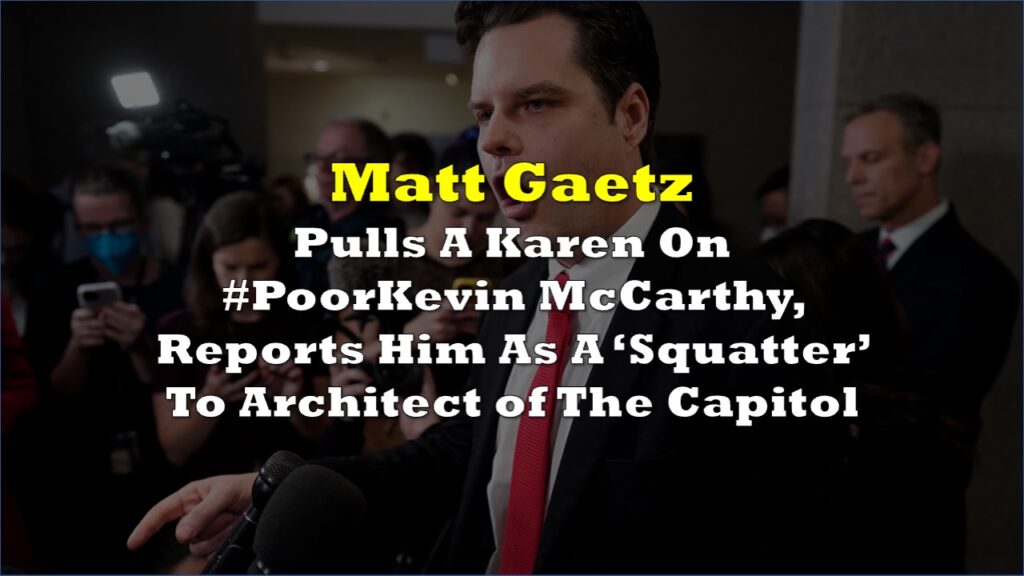In a bold and consequential move, Republican Representative Matt Gaetz of Florida launched a campaign on Monday to unseat Speaker Kevin McCarthy, setting the stage for a high-stakes showdown that could disrupt the House of Representatives. Gaetz’s action was seen as a form of retaliation against McCarthy for relying on Democratic votes to prevent a government shutdown, a move that did not sit well with a faction of hard-line conservatives within the Republican Party, including Gaetz.
GAETZ: "DECLARING THE OFFICE OF THE SPEAKER OF THE HOUSE OF REPRESENTATIVES VACANT."
— Jake Sherman (@JakeSherman) October 2, 2023
He has filed his motion to vacate.
Gaetz: I rise to give notice of my intent to raise a question of the privileges of the house. Declaring the office of Speaker of the House to be vacant… pic.twitter.com/07bv8Q03sz
— Acyn (@Acyn) October 2, 2023
After days of mounting tension, Gaetz took to the House floor on Monday evening, introducing a resolution to declare the speakership vacant. This initiated a process that would require a vote within days to determine McCarthy’s fate as Speaker of the House.
“Declaring the office of the Speaker of the House of Representatives vacant,” Gaetz said after he was given the time to declare his resolution.
Laughter filled the Democratic side of the House as Gaetz departed from the floor following his motion.
House Democrats laugh at Matt Gaetz as he walks off the Floor after making his Motion to Vacate McCarthy. They can kick back for a few days, then wait for Kevin to slink down to Jeffries office looking for a lifeline. pic.twitter.com/uXqmqENtGy
— Ron Filipkowski (@RonFilipkowski) October 2, 2023
After submitting the motion to vacate, Gaetz addressed a group of reporters, stating, “Well, I have enough Republicans where, at this point next week, one of two things will happen. Kevin McCarthy won’t be the Speaker of the House, or he’ll be the Speaker of the House working at the pleasure of the Democrats, and I’m at peace with either result, because the American people deserve to know who governs them.”
Gaetz expressed his openness to endorsing Louisiana Republican Steve Scalise, the current Deputy to McCarthy, as a potential successor to the Speaker during his conversation with reporters outside the Capitol on Monday night.
Before Gaetz delivered his floor speech, Tom McClintock, a California Republican, strongly criticized the attempt to remove the Speaker, characterizing it as a “self-destructive course.” While not explicitly mentioning his colleague from Florida, McClintock urged fellow Republicans “to look past their prejudices, their passions, their errors of opinion, their local interests and their selfish views.”
McCarthy vs. Gaetz
If successful, this maneuver would subject McCarthy to an unusual form of political consequence experienced only by two other speakers in the House’s 234-year history. Never before in US history has a Speaker been removed through the use of such a motion to vacate.
The leadership now has a two-day window to schedule a vote on this measure, although there are procedural tactics that could potentially obstruct this process.
The genesis of this power struggle can be traced back to McCarthy’s decision to collaborate with Democrats to pass a stopgap spending bill, thereby averting a government shutdown. This approach, necessitated by the refusal of Gaetz and his cohort to support a temporary funding bill, infuriated the Florida representative.
The agreement reached late on Saturday to prevent a government shutdown did not include $6 billion in funding for Ukraine. This omission was the result of pressure from ultraconservatives like Gaetz, who argued that the United States had already allocated too many resources towards Ukraine’s conflict with Russia.
Gaetz accused McCarthy of misleading Republican members during spending negotiations and forging a “secret deal” with Democrats regarding funding for Ukraine, a stance that resonated with numerous conservative lawmakers.
This move marks an escalation in the ongoing power struggle between McCarthy and a group of conservative hard-liners within his party. They had threatened to challenge McCarthy’s leadership since his election, subjecting him to a grueling series of 15 votes.
McCarthy, known for his resilience and determination, remained unfazed. Shortly after Gaetz filed his resolution, McCarthy responded with a defiant “Bring it on.” He emphasized his commitment to prioritizing the country’s work and stressed the need to win the vote for the sake of the American people.
Gaetz replied: “Just did.”
The House majority is now 4th grade recess. pic.twitter.com/KxrslgVxMC
— Ron Filipkowski (@RonFilipkowski) October 2, 2023
Gaetz’s grievances against McCarthy extend beyond the recent funding dispute. He emerged as McCarthy’s chief antagonist during a January battle when he publicly insinuated that McCarthy had been involved in questionable financial dealings for over a decade.
To appease Gaetz and his fellow dissenting Republicans, McCarthy had previously altered House rules to allow for the removal of the Speaker via a snap vote. However, instead of proceeding with this, they temporarily shut down the House floor.
Across the aisle
The level of support for Gaetz’s motion among fellow Republicans remained uncertain, but he asserted that he had garnered enough backing from the GOP to succeed, unless Democrats intervened to save McCarthy. If Democrats were to vote against McCarthy, as is typically the case when the opposing party’s Speaker is being elected, Gaetz would only need a handful of Republican defectors to succeed.
To remove the Speaker through a floor vote, a simple majority of the House is needed, which amounts to 218 votes when all seats are occupied. Currently, Republicans hold a slim majority in the chamber with a count of 221-212. However, only a small number of staunch Republicans have shown a willingness to support the removal of McCarthy.
However, McCarthy’s fate could hinge on whether enough Democrats choose to support him, abstain from voting, or vote “present.” Some moderate and conservative-leaning Democrats indicated reluctance to punish McCarthy for his bipartisan efforts to prevent a government shutdown. Others, though, saw no reason to come to his rescue, citing concessions made to appease his right-wing base, including launching an impeachment inquiry into President Biden.
Representative Ilhan Omar was particularly critical of McCarthy, citing his stance on abortion rights and climate change, characterizing him as a “weak speaker” who prioritized self-interest over the Constitution.
Gaetz’s actions have irked McCarthy’s allies, who perceive his campaign as a self-serving publicity stunt driven by personal animosity. Even some Republicans who initially opposed McCarthy’s speakership indicated they would not support Gaetz’s efforts. Representative Chip Roy of Texas suggested he would only consider removing McCarthy if he approved aid to Ukraine without addressing border security concerns.
However, Democrat New York Representative Alexandria Ocasio-Cortez mentioned in an interview with CNN on Sunday that some of her Democratic colleagues might consider offering political support to McCarthy if they can secure certain concessions from him in return.
McCarthy and his allies may employ procedural tactics to avoid a direct vote on his speakership, such as tabling the resolution or referring it to a committee. Nonetheless, Gaetz’s move thrusts the House into uncharted territory.
Only two other speakers have faced motions to vacate in the past, in 1910 and 2015, when Representative Mark Meadows sought to oust Speaker John A. Boehner. While the House never voted on the motion in the latter case, it contributed to Boehner’s eventual decision to resign from Congress.
Information for this story was found via The New York Times, BBC, and the sources mentioned. The author has no securities or affiliations related to the organizations discussed. Not a recommendation to buy or sell. Always do additional research and consult a professional before purchasing a security. The author holds no licenses.









